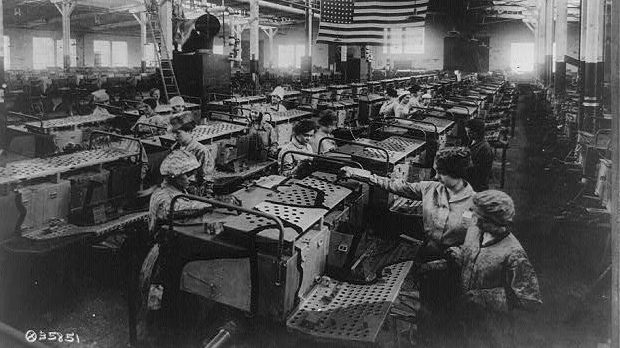How nostalgia for an economic past changes Michigan politics today
“There were aspects of your life connected to your employment in industrial Michigan that made life a lot easier,” says Politico journalist Gavin Bade.

A Detroit Factory circa 1914-1918. Photo credit: Library of Congress.
There was a moment during the pandemic when things felt optimistic for many. The labor market was getting tighter, people were getting higher wages and more labor unions were forming.
But many in Michigan still feel left out of broader economic gains. Housing, prescription drug prices, healthcare, child and eldercare, transit and safe retirement — all of these things cost a lot and incomes are not keeping up to pay for them.
According to new reporting by Politico reporter Gavin Bade, that fact has left people wanting for a previous economy that allowed more people to feel more secure than is true today.
“We’re not just talking about a factory, we’re talking about trying to rebuild that sense of community, that sense of American society that the industrial era afforded. The problem is corporations just aren’t doing that anymore,” — Gavin Bade, Politico
Listen: How Michiganders envision a more inclusive economy.
Guests
Gavin Bade is a trade and economics reporter for Politico. He recently wrote, “Glory Days: In Michigan, Nostalgia for a Romanticized Past Outstrips the Reality of an Economic Rebirth.” He says that previous jobs represented a way of life that is now gone for many.
“We’re not just talking about a factory,” says Bade. “We’re talking about trying to rebuild that sense of community, that sense of American society that the industrial era afforded. The problem is corporations just aren’t doing that anymore.”
Chad Livengood is a politics editor and a columnist at The Detroit News. He says he’s concerned about continued job loss in Michigan as the economy transitions to an electric vehicle market.
“The internal combustion engine has a thousand parts and an electric battery has about 10% of them,” says Livengood, “and that drivetrain on vehicles has been a big driver of our economy for a long time — particularly in Southeast Michigan.”
Trusted, accurate, up-to-date.
WDET strives to make our journalism accessible to everyone. As a public media institution, we maintain our journalistic integrity through independent support from readers like you. If you value WDET as your source of news, music and conversation, please make a gift today.
